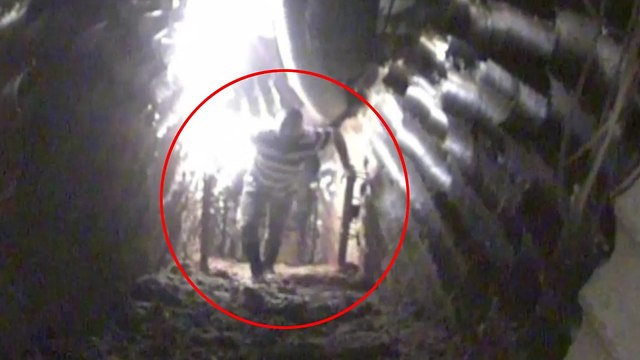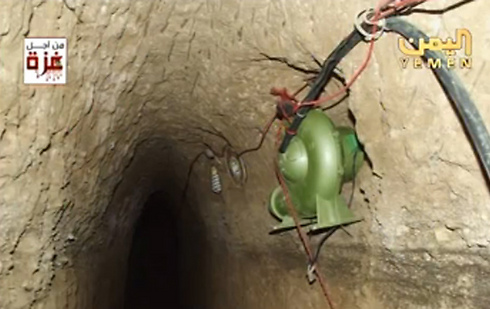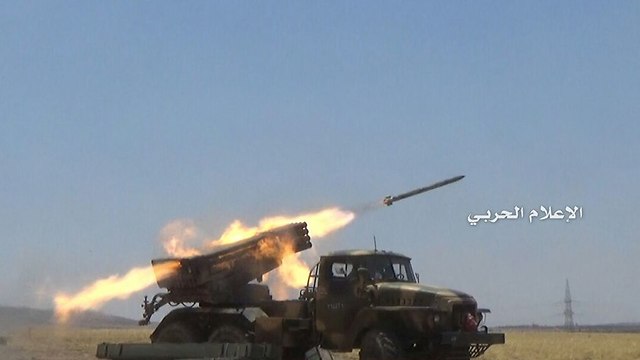Analysis: Hezbollah assists Houthis in their war with the Saudis and hides Iranian weapons underground in the Bekaa Valley. Now that Assad has regained control of Syria, Nasrallah is back to his usual focus: preparing for war with Israel.
Hezbollah’s role in Syria has ended. The organization is now re-engaging in its regular role: preparing for a war against Israel. Hezbollah is preparing for the next battle in the air, on the ground and underground with thousands of recently upgraded missiles, battle-hardened fighters trained in Syria and underground tunnels.Hezbollah’s role in Syria has ended. The organization is now re-engaging in its regular role: preparing for a war against Israel. Hezbollah is preparing for the next battle in the air, on the ground and underground with thousands of recently upgraded missiles, battle-hardened fighters trained in Syria and underground tunnels.
In contrast to the uproar in Israel over the exposure of the Hezbollah tunnels, the terror group’s Al-Manar channel’s news broadcast on Tuesday was quite laconic: “There is quiet on the southern border of Lebanon except for bulldozers near Kafr Kela and the Fatma Crossing, following statements by the military spokesman of the Israeli enemy regarding Operation Northern Shield to expose the tunnels Hezbollah had dug.” The Lebanese Al-Mayadeen channel also reported on the operation to expose the tunnels that “the Zionist enemy claims were dug by Hezbollah.”

In recent months, the Arab media has been discussing the question of whether Hezbollah was in fact digging tunnels in Lebanon in preparation for the next war against Israel. The concern grew especially in Lebanon. One commentator for the Lebanese Al-Nahar daily raised a disturbing question: “Does Hezbollah’s policy serve Lebanon’s goals or the organization’s goals alone?”
It turns out that Hezbollah has been busy for years digging tunnels not only in Lebanon, but also toward Syria and Israel and even in Yemen.
Yemen tunnels dug with guidance by Hezbollah
For anyone who may have doubts over Hezbollah’s excavation abilities, the proof is in Yemen. For several years now, Hezbollah advisors have been dispatched to help the Shi’ite Houthis in Yemen in their war against Saudi Arabia. The consultation includes tactics for fighting against a regular army, aiming missiles and hiding from bombings.
Four years ago, the London-based newspaper Quraysh revealed that the Houthis were digging a 100-meter-long system of tunnels in al-Khudeida in northern Yemen. The tunnels are both defensive and offensive: for hiding and concealing weapons during bombings, and for infiltrating into the kingdom of Saudi Arabia.

According to the paper, “the excavation is carried out with the assistance of Iranian experts who have supervised such work in southern Lebanon since the war against Israel in 2006.” The Saudis uncovered the tunnels in October 2014 and blew up the section in Saudi Arabia.
If there are still any doubts left regarding Hezbollah’s tunnel excavation ability, an October 2018 report from the Orient revealed that weapons brought on civilian flights from Tehran to Beirut and Damascus are being stored in underground tunnels between Syria and Lebanon (in Al-Qusayr, which is in the Bekaa Valley)—tunnels that were dug by Hezbollah during the civil war in Syria.
These underground missile and weapon depots are in addition to those recently uncovered by Israel in the capital Beirut—near the airport and under a large football field. According to several sources, the tunnels in Syria are intended not only to conceal weapons, but also to train Houthis and even smuggle drugs.
Lebanese people as ‘human shields’
Most Lebanese military commentators explain that the tunnels are a result of the lessons learned from the 2006 Second Lebanon War, and they are meant to protect Hezbollah fighters and equipment from Israeli bombardments. The border area of al-Qusayr-Zabadani is strategically convenient for Hezbollah, because it is mountainous and, in relation to other areas, harder for fighter planes to bombard.
Lebanese commentator Ahmad al-Ayyubi claims that Hezbollah acts without any regard for Lebanon, and in 2006 it brought about disaster and massive destruction to Lebanon—all because of the irresponsible move of abducting IDF soldiers, which only serves the interests of the organization.

Now, the tunnels are liable to bring about the same results. According to Al-Ayyubi, Hezbollah is defending itself, not the Lebanese people. In the next war, the organization’s fighters will hide in the tunnels, while the civilians will suffer bombardments by Israeli planes. The Lebanese civilians have become human shields for the organization.
The theme of “conquering the Galilee” is often repeated in the discourse of the organization’s leaders. The ideological excuse for such an operation is related to the history of southern Lebanon. Changes enacted by the British Mandate in 1923 moved the border a few kilometers north, and seven Shiite villages in the north of the Galilee became part of what was then Mandate Palestine. These villages no longer exist, and their inhabitants fled to Lebanon during the 1948 War of Independence, but Hezbollah claims that these areas still belong to Lebanon in general and to the Shiite community in particular.
The organization’s most significant training for a ground war against Israel was not in Hezbollah camps or camps of the Iranian Revolutionary Guards, but in Syria itself, with live fire and real battles against Assad’s opponents and rebel groups. This has been the case over the past six years. Hezbollah’s motivation and successes in battles in Syria, especially in the years 2012-2014, should serve as a warning to the IDF.
And above ground: missiles
A video recently circulated by Hezbollah shows the latest upgrades made to the precision of its missiles—or, more precisely, the upgrades Iran has made. It is worthwhile paying attention to the targets marked in the video together with aerial photographs: a list of IAF bases (Palmahim, Tel Nof, Ramat David, etc.), the reactor in Dimona, and the heavily industrial Haifa Bay (in Nasrallah’s words: “Hezbollah’s atomic bomb”), where an explosion can be extremely deadly.
Hezbollah is no longer preoccupied with rescuing Syrian President Bashar Assad and is now free for its usual activities—preparing for war against Israel. Its success in Syria gives the organization high military motivation and belief in its capabilities.
After the war in Syria, its fighters are well trained. Thanks to Russia’s direct intervention in Syria, Hezbollah did not have to “waste” its missiles against the rebels there. Their missile arsenal is huge, and now it also has tunnels into Israel.
The discovery of the tunnel near Metula is only the tip of the iceberg for a whole tunnel system in Lebanon and on the borders with Syria and Israel. In fact, Hezbollah is far more prepared for a campaign against Israel than it in 2006.
Should Israel now sit and wait for the organization to receive more weapons, more training and more economic and logistical assistance from Iran? Although the economic blockade by the United States on Iran can cause, in the long term, significant harm to Hezbollah, from a security perspective, can Israel afford to keep waiting?
As reported by Ynetnews
